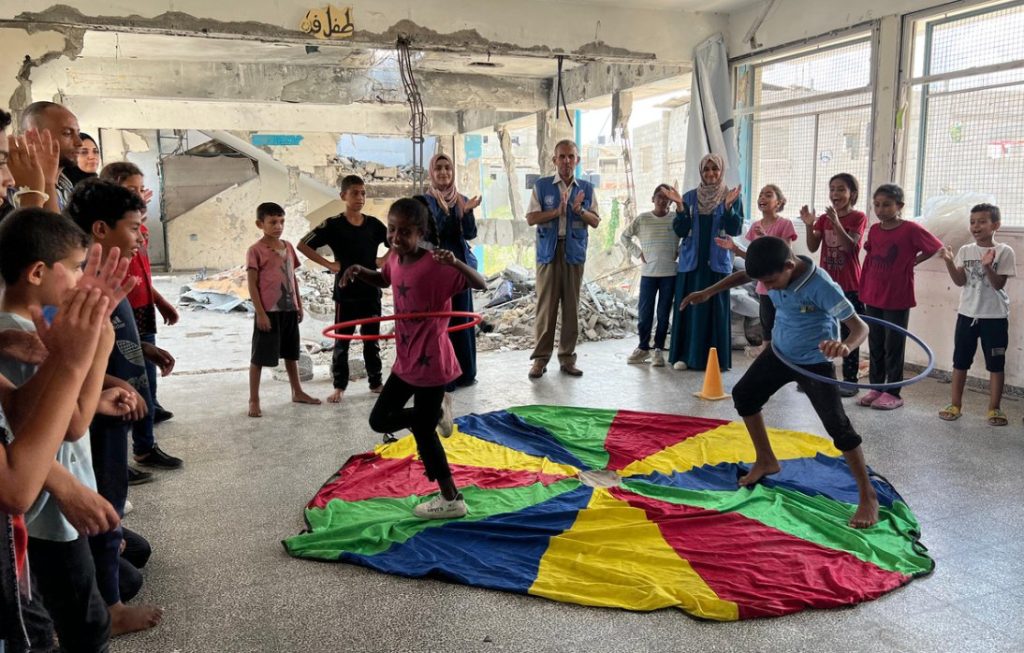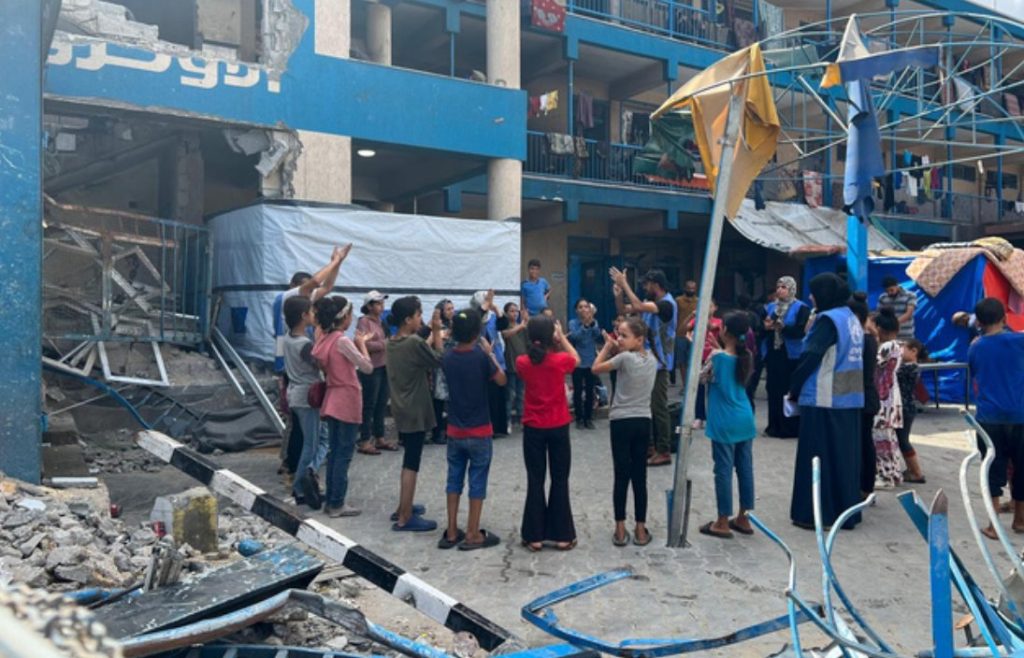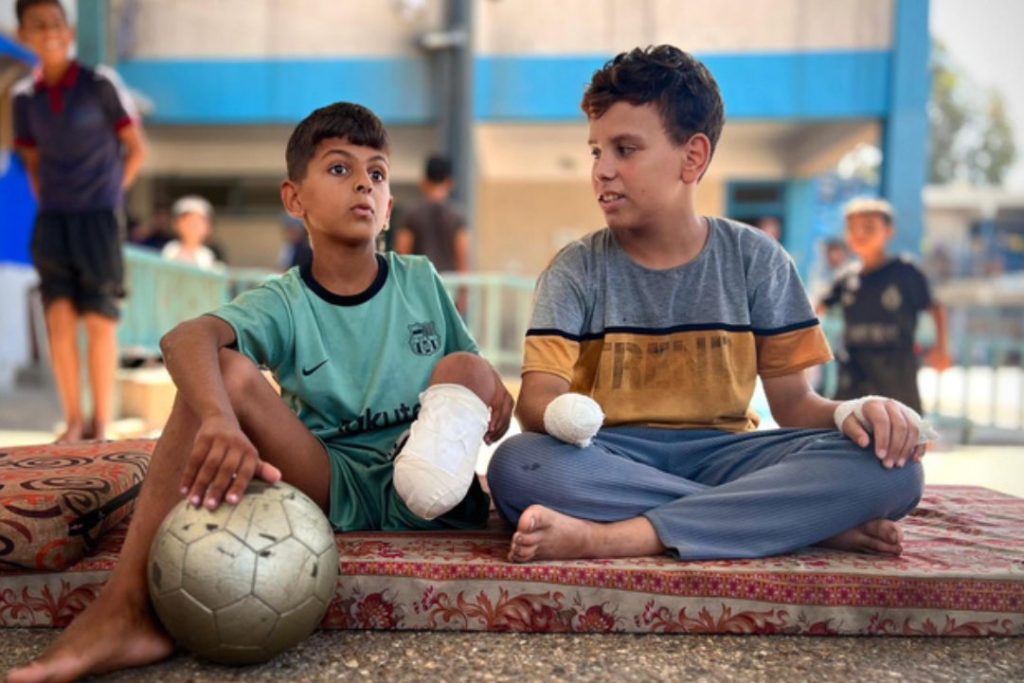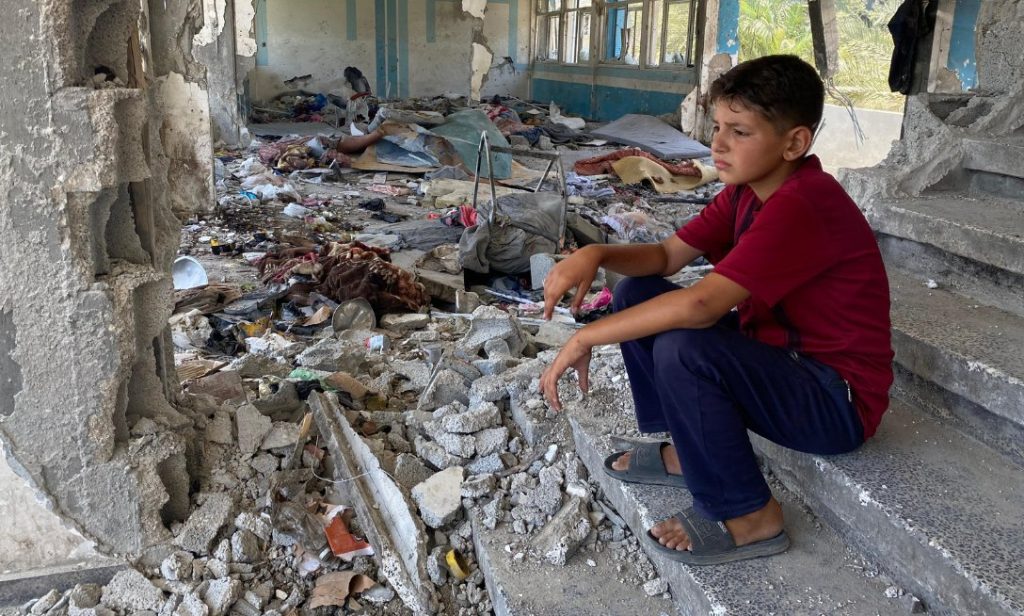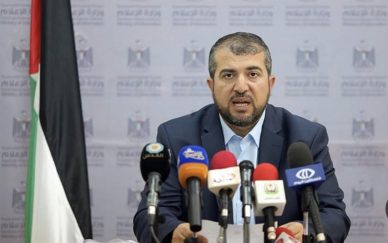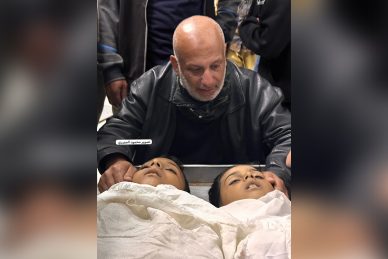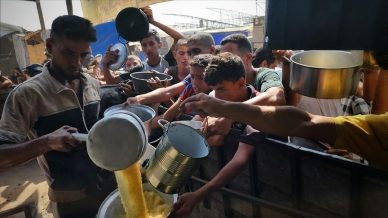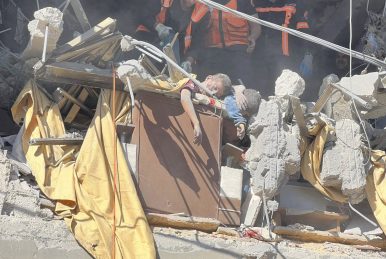GAZA, (PIC)
In her tattered clothes and without shoes, 8-year-old Saja Abu Ma’liq sits inside her family’s tent in the Muwasi area of Khan Yunis, holding a pencil and writing some letters and words, trying to join the education race that Israel has been attempting to derail for the second year amidst ongoing genocidal warfare.
Nearby, her injured father sleeps on what resembles a mattress, while her younger siblings play under the scorching sun. The family, consisting of six members, is crammed into a dilapidated tent that barely spans 18 square meters.
The reality is extremely painful; it cannot be summed up in words. This 18 square meters tent serves as their shelter where they eat, drink, sleep, study, and bathe. It is a nightmare—a nightmare experienced by nearly two million Palestinians for the past 11 months, with its repercussions worsening day by day.
A lost school year
Saja’s mother tells a reporter from the Palestinian Information Center that last year was lost for her daughter. When she heard that the Ministry of Education had launched virtual learning, she quickly registered her daughter, despite the immense difficulties.
She adds that she had to travel to an area two kilometers away from their tent to access the internet and register her daughter in virtual classes, then return to begin the search for whatever papers and pencils she could find to start her daughter’s education journey.
She continues, “It is very difficult; no one can imagine how education can progress under these circumstances, living in a tent, being displaced, facing bombardments, and lacking basic necessities for life.”
However, she insists, “We have no option but education. Even if I have to carve through stone or climb mountains, I will do everything in my power to ensure my daughter Saja can pursue her studies, despite the enormous challenges, including internet access, psychological conditions, and the lack of a suitable environment.”
Journey for a master’s degree
In a tent on the beach of Deir al-Balah, young Ala’a Al-Khatib sits on a mat above the sand, placing his laptop between his feet, engrossed in writing a few lines for his master’s thesis.
Al-Khatib, who is enrolled in a master’s program in Business Administration at Al-Azhar University, states that the prolonged war has left him with no choice but to complete his thesis.
He tells our reporter, “It is difficult, no mind can comprehend it, but with will and determination, it can happen.”
“I spend long hours searching for a power source and more hours looking for internet access. Without both, I cannot write or accomplish anything for my thesis, and frankly, it’s exhausting,” says Al-Khatib.
Virtual education
The official spokesperson for the Ministry of Education and Higher Education, Sadiq al-Khudur, stated that the ministry has begun implementing educational interventions for students in the Gaza Strip, which include launching virtual schools through special links that students can join, focusing on the core subjects for each grade.
Al-Khudur explained that the virtual education system operates in modules, providing intensive educational materials that emphasize the essential skills for each subject, building on prior learning and preparing for future learning. When a student is promoted to the next grade, the ministry ensures that they have acquired the knowledge and skills necessary to advance.
He added that the first half of this year will be dedicated to addressing the requirements of the previous academic year due to the aggression against the Strip, while the second half will be allotted for the grade the student is expected to be in. Thus, they aim to integrate two academic years into one. He noted that the ministry issues special links for virtual education daily until stable platforms can be set up for students. These links cater to each grade individually, with teachers from the West Bank teaching core subjects at three in the afternoon, allowing students to return to the recorded classes whenever they want, given the lack of internet stability.
Targeting education
According to data published by the Ministry of Education and Higher Education, the genocidal war on Gaza has resulted in the deaths and injuries of over 25,000 children, including more than 10,000 school students, alongside the destruction of 90% of the 307 government school buildings.
The ministry indicated that over 630,000 students have been deprived of their right to education since October 7, 2023, and an additional 58,000 are expected to enroll in the first grade this new school year, as well as 39,000 who did not take the general secondary exam.
According to the data from the United Nations Relief and Works Agency for Palestine Refugees in the Near East (UNRWA), 200 schools, representing 70% of its educational facilities, have been completely or partially destroyed due to ongoing Israeli bombardments. It confirmed that more than 600,000 children are suffering from deep trauma, living under rubble, and remain deprived of learning and education, half of whom were in UNRWA schools.
All Palestinian universities in the Gaza Strip -12 total- have been completely destroyed or severely damaged due to airstrikes, shelling, or even demolition by explosives.
According to the Euro-Med Human Rights Monitor based in Geneva, the Israeli attacks against the Gaza Strip have led to the destruction of the higher education infrastructure. The Monitor estimates that the damage to the universities amounts to over 200 million euros, and at least three university presidents and more than 95 deans and professors have been killed since October 7, 2023, while around 88,000 students have been forced to suspend their studies, and 555 other scholarship holders were unable to travel abroad due to violations.
The Monitor clarified that the Israeli army carried out deliberate and targeted attacks against academic, scientific, and intellectual figures in the Gaza Strip, many of whom were killed in direct airstrikes targeting their homes without warning, crushed under the rubble along with their families or other displaced families.”
Deprivation of education
For 10-year-old Muhammad Abu Sahloul, a fourth-grade student, the situation is very dire, especially since he cannot join the virtual classes. His family is suffering from extreme poverty and is displaced in a tent in the Muwasi area of Khan Yunis after their home was destroyed during the ground invasion.
His father told our reporter that he cannot provide a smart device for his children to join virtual schools, emphasizing that it is beyond his financial capacity. “Before the war, I worked as a laborer, and since the war began, I haven’t earned a single shekel.”
With sorrow, Abu Sahloul calls for fundamental solutions to the education crisis, ensuring that all children and students can return to their schools, calling for a complete end to the war and addressing its repercussions.
He asserts that the weapon of Palestinians is their will and education, urging all Palestinians to fight against the policy of ignorance pursued by Israel, stressing that the psychological condition of children is also important.
Deep sorrow
With deep sorrow, Ibrahim Mahmoud, 41 years, a resident of al-Shati refugee camp west of Gaza City, told our reporter that he does not know what lies ahead for his three children. He added, “This is the second year without schools. My youngest son should be in the second grade now. He studied for a month, and then the war started. Even if the war ends, there will be no ministry, no schools, no teachers, and no students.”
Ibrahim tries to teach his children some of what he knows, believing it is essential for their lives. Among other things, he checks if it is possible to hire a teacher for his three children, a solution some wealthier families have resorted to.
Regarding the virtual education idea announced by the Ministry of Education in Ramallah, he confirms that it is ineffective, saying in colloquial terms, “How can we teach our children online when we are constantly moving from one place to another, with the army entering some areas and we flee to others, not to mention the internet and electricity problems?”
